Calais migrant crisis: The Britons in the 'Jungle'
- Published
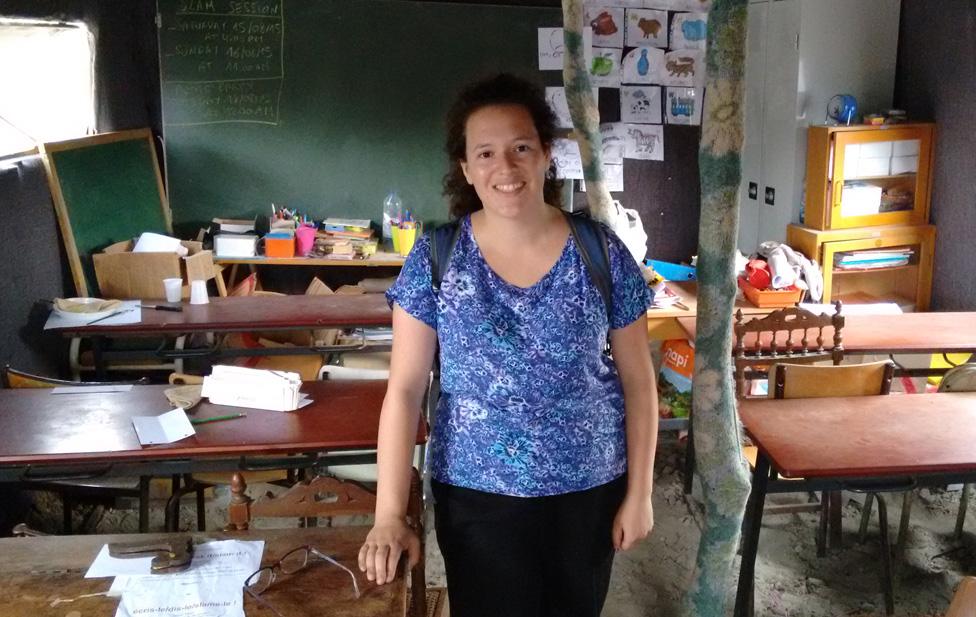
Joanna Sutton-Klein, a medical student, is helping out at the school during her summer holidays
Thousands of migrants are camped in and around Calais. A handful of British people can be found there too. What are they doing?
Matthew Wright grew tired of shouting at the TV.
"I got sick of hearing the excuses and the lack of action," says Wright, 45. "This isn't an immigration crisis - it's a humanitarian crisis."
He arrived in the camp known as the Jungle last week and plans to stay until late August - going home in time for his wife Heather's birthday. The former salesman, from Ormskirk in Lancashire, is studying modern languages through the Open University and Heather, who works in a hospital, is paying for him to be here, he says.
Wright says he - as part of a team of charity workers and volunteers - had helped feed more than 2,000 people in two hours. But the population of the Jungle is estimated to be more than twice that number.
"When the food runs out there are still people queuing," he says.
Calais migrants making nightly bids to cross the Channel have attracted negative press coverage in the UK. Prime Minister David Cameron has promised the UK will not become a "safe haven" for them.
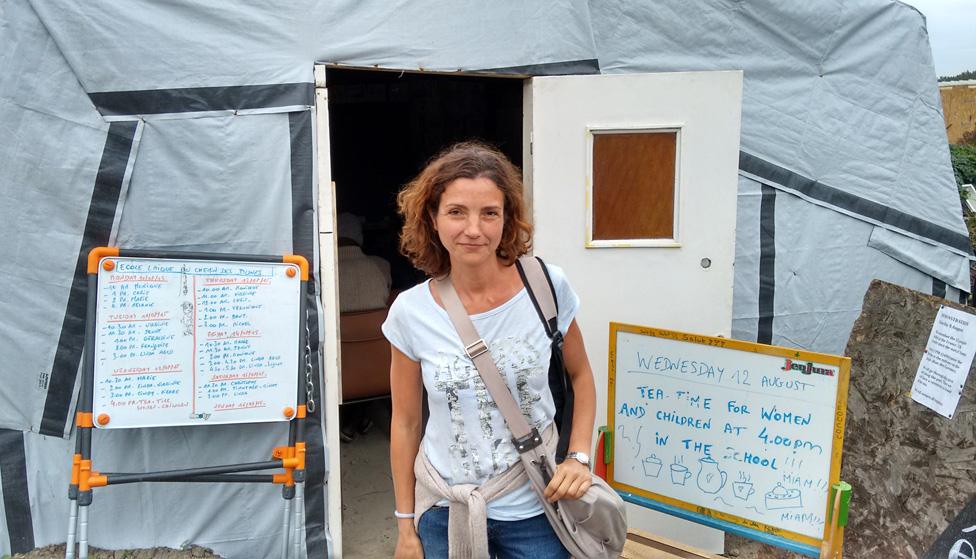
Virginie Tiberghien runs a school, which operates out of a tent, in the "Jungle" camp
But Wright believes the British public will do more and more to help the migrants: "I know how generous British people are."
The handful of Britons helping in the camp - and several more who have told the BBC they plan to go there - say it's difficult to find out how to volunteer and how best to deliver supplies. Most have made contact with charities working in the Jungle, or other UK volunteers.
UK online communities have been set up to support them in Calais, and posts on them suggest a growing number of British people plan to visit the camps.
Tom McElholm, 19, from the West Midlands, says he decided to get involved after seeing a video in which members of far-right group Britain First went to Calais and were "disrespectful" towards the migrants.
The footage made him feel sad and ashamed, he says.
"I used to have a quiet pride that Britain was more liberal than most countries, but now there is a worrying strand of xenophobia running through social media and the press," he adds. The St Andrews University student is taking a carload of supplies to Calais.
Once he arrives he will spend his time volunteering for Association Salam - a charity set up to help the Calais migrants - "doing whatever I am told".
Relief efforts in the Jungle reflect the chaotic nature of the camp, with several charities and groups of volunteers working but no single organisation co-ordinating them.
Food, water, toilets and showers, as well as shelter and education for children, are provided by the Jules Ferry relief centre - funded by the French government and supported by several charities.
But separately, among the banks of sand and mud and clusters of tents, there is a Medicins du Monde medical centre, a school for adults and a point where food and other aid items are handed out each afternoon.
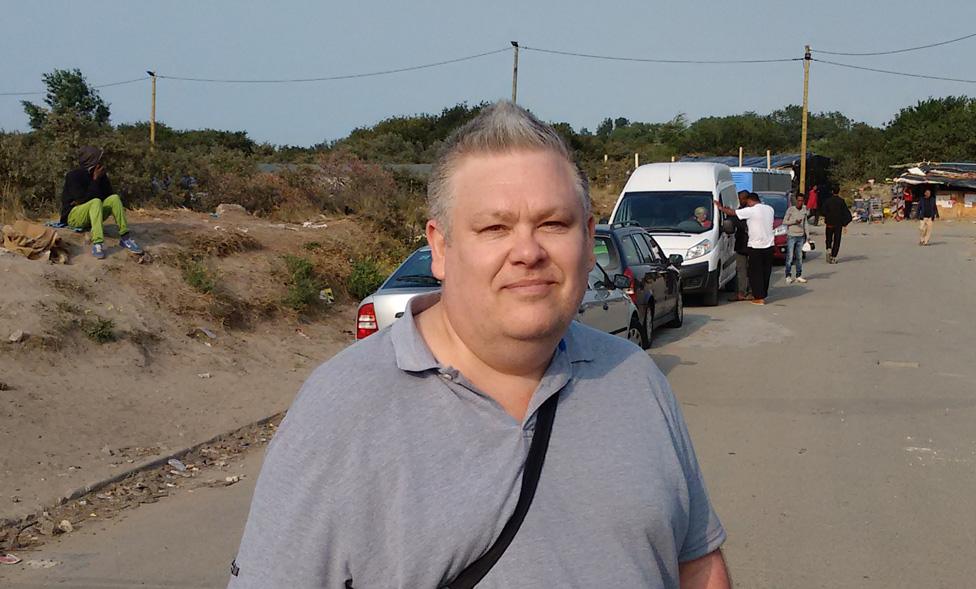
Matthew Wright plans to stay at the camp until late August
Joanna Sutton-Klein, 21, a medical student from north London, arrived in Calais on Wednesday intending to stay for a week.
"I've just started my summer holidays and I've seen everything on the news and felt drawn to come out here," she says. "It seems so odd that this is happening on our own doorstep. I wanted to get involved and help out."
Sutton-Klein is helping with French lessons at a school which operates from a tent in the Jungle camp. "I particularly wanted to help in the school and I managed to track down a Facebook group," she says.
She wants to encourage more women - some of whom feel "uncomfortable" learning alongside men - to come to the school. Sutton-Klein says she is staying in a youth hostel, but adds: "I have a tent with me so if needs be I can stay in the camp."
Most volunteers say the camp is peaceful, but some migrants say it is a dangerous place - especially for women.
It is noticeable that the police stand on the motorway embankment overlooking the camp, but do not patrol inside.
Asked about her safety, Sutton-Klein says: "It feels quite safe in the camp."
She says she "wouldn't feel unsafe" sleeping there, but she says it would be "uncomfortable" because there are few toilets and the only showers are in the Jules Ferry centre - and there are not enough for everyone.
The school - about 200 yards down a dirt road from the Jules Ferry centre - teaches French, art and music.
Virginie Tiberghien, who runs the school, says it taught a "little English" - and the arrival of a group of teachers due from the UK will make that easier.
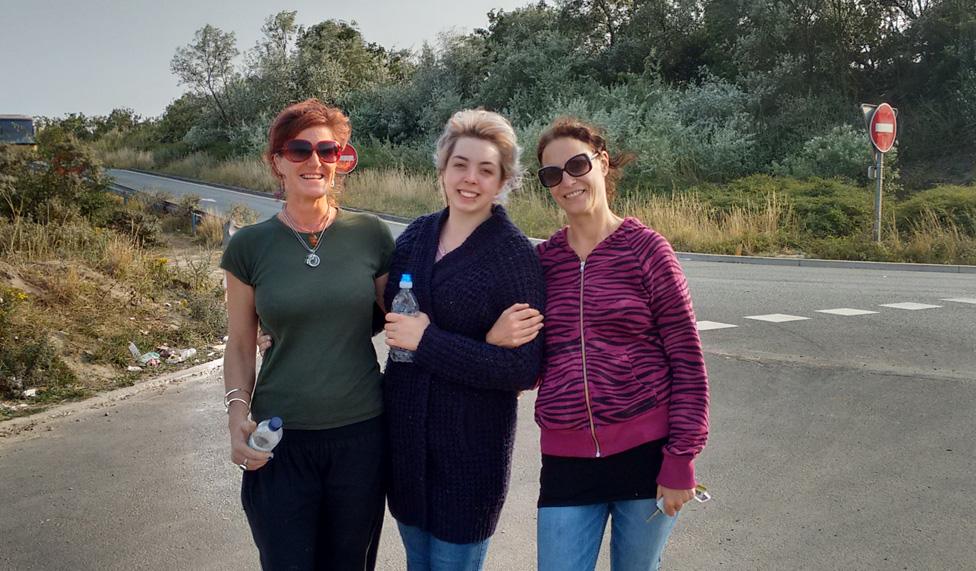
Vikki, Lottie and Shaz, from Brighton, took a day-trip to Calais to drop off supplies
Vikki Ita, Lottie Morphew-Hedges and Shaz Swart drove from Brighton on a day trip to drop off supplies including women's sanitary items. "I had a week where my children were away and I suggested we should come here," says Ita.
Morphew-Hedges says she knew people who wanted to help the migrants, but many were too "scared of the unknown" to make the journey.
"You don't know what you're going to find. We have found wonderful, beautiful people and we really want to help."

More from the Magazine
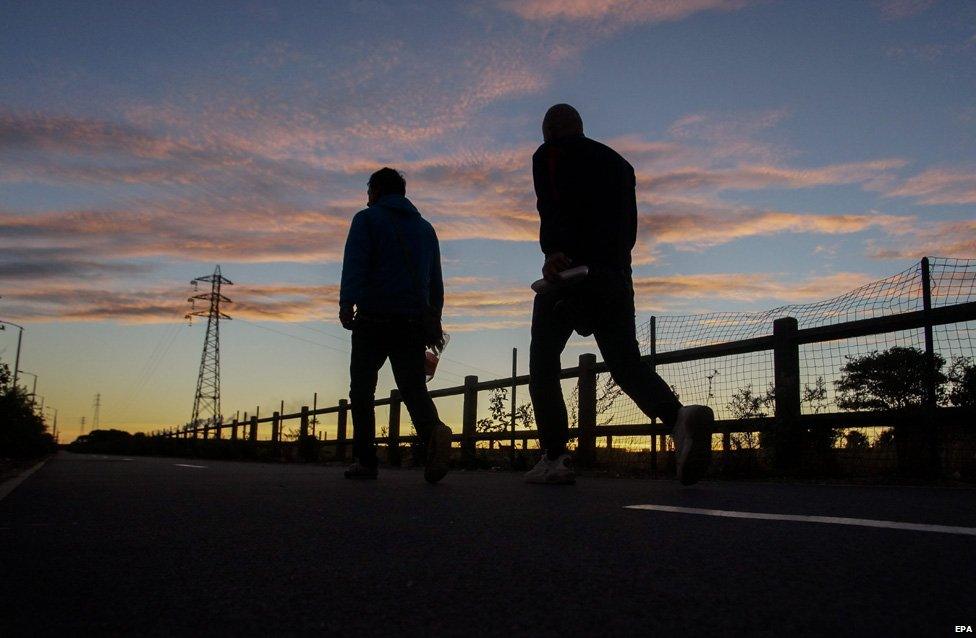
Every night hundreds of migrants risk their lives to reach the UK via trains and ferries from Calais. Some say new security measures mean it is now too dangerous - though most still harbour hopes of crossing. But what do they know about the country many are so desperate to reach?

Subscribe to the BBC News Magazine's email newsletter, external to get articles sent to your inbox.